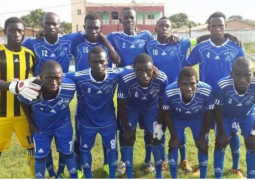
The GCAV project is directly aimed at improving food security by increasing production and market access for targeted agricultural commodities.
The project aims to transform the national agricultural sector from a traditionally subsistence economy to a modern market-oriented commercial sector with a viable agro-processing private sector.
The selected value chains targeted for support are rice and horticulture (covering both vegetables and mangoes).
This was revealed during the one-day validation of the GCAV Vaseline Survey commissioned by GCAV under the Ministry of Agriculture, held recently at the Baobab Hotel.
The main objective of this Baseline Study for GCAV was to identify, collect, describe and analyse baseline values for the specific indicators pertinent to the project’s resulting framework that will serve as benchmark for assessing project outputs, outcomes and impact on beneficiaries in the project intervention areas.
According to the draft report, the two interlinked surveys were carried out in the Central River Regions (North and South), (CRR/N & S), the West Coast Region, and North Bank Region (WCR and NBR respectively).
The report indicated that in the WCR and NBR, the survey focussed on farmers engaged in vegetable and mango production whilst in CRR/N & CRR/S the focus was on rice producers.
The first survey was at the household level and it collected quantitative household data on the demographic and socioeconomic profile of the farmers engaged in rice, vegetable and mango production.
The second survey focussed on the collection of secondary data, review of relevant documents and the conduct of Focus Group Discussions with producer associations/groups/individuals engaged in rice production, tidal irrigation schemes, horticultural garden schemes, processing and marketing of agricultural produce, VISACAs and all other major stakeholders in the value chains of rice, vegetables and mangoes.
The draft report further indicated that the study, the Household Level Survey, was conducted in fifty-two villages across three regions.
A total of one thousand and nineteen households were surveyed and two thousand and thirty-eight respondents were interviewed and quantitative data collected and analysed.
The survey was conducted in the following two parts: the Household Survey in WCR and NBR was conducted in 20 villages and covered four hundred households and eight hundred respondents engaged in vegetable and mango production.
Regarding the Survey in CRR/N and CRR/S, it was conducted in thirty-two villages and covered six hundred and nineteen households and one thousand, two hundred and thirty-eight respondents engaged in rice production.
The report stated that the results of the survey on level of education of HH members have shown that generally, HH members in West Coast Region (WCR) are better educated than their counterpart in the North Bank Region (NBR).
In this regard, the survey results confirmed that 71.65 per cent of HH members in WCR had some level of tertiary education whilst in comparison the corresponding percentage for NBR is 28.4 per cent, whilst in the NBR, 48.2 per cent of respondents deemed that it was sufficient.





